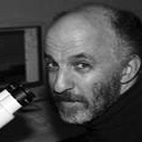By George Wigmore, on 31 January 2012
“In the beginning, the Universe was created. This has made a lot of people very angry and has been widely regarded as a bad move.”
 While the above Douglas Adams quote may aptly describe the prevailing universal sentiment, we still continue to search the skies with SETI for any signs of complex life.
While the above Douglas Adams quote may aptly describe the prevailing universal sentiment, we still continue to search the skies with SETI for any signs of complex life.
In the 50 years of searching, SETI has turned up nothing, yet the question still remains as to whether complex life itself is a freak accident, or an event that could have occurred somewhere else in our universe.
It was this question that Dr Nick Lane (UCL Genetics, Evolution and Environment) and author of Life Ascending: The Ten Great Inventions of Evolution, aimed to answer in the 35 brief minutes that he had to contextualise, and explain the background to an incredibly difficult question that is still hotly debated.
Sneaking down the steps to the front of a jam-packed lecture theatre, I had a palpable sense of impending fear as I struggled to recall as much undergraduate biochemistry as I could in time for the lecture.
But my fears were unfounded, as Dr Lane proved to be a wonderful guide, as he deftly talked us through the complicated facts and figures in a clear and unpatronising manner.
Advent of Complex Life
“There may be plenty of bacteria out there”, said Dr Lane, “but what are the chances of complex life?”
Looking at the tree of life, it is a question that really becomes much more apparent, as it’s strange to think that after four billion years of evolution we still only have three branches of life, consisting of bacteria, archaea and eucarya. With the latter including all complex life as we know it.
With all this complexity arising only once, and within the past 2 billion years, it is still staggering to think that all the complexity around us – and such essential eukaryotic components and traits such as the nucleus, mitosis, sex, phagocytosis and mitochondria – such a recent addition to life itself.
Bottlenecks
So what could have caused this freak of nature; this biological anomaly?
Dr Lane suggested that the rift could have been caused by a bottleneck, with only the best adapted going on to make it through this tight genetic or environmental squeeze. But once through, such survival would have facilitated rapid evolution and the explosive radiation of new forms of life.
But what form did this bottleneck take? Was it increasing oxygen levels? Environmental collapse? The answer, it seems is much smaller, biologically ubiquitous and seemingly more powerful: mitochondria.
These cellular powerhouses appear to be the biological bottleneck that gave rise to the first eukaryotic cells – quite literally fuelling their rise and increasing complexity.
The event that kick-started this development was the rare engulfment of a single bacterium by a fellow prokaryote. How this happened, no one knows, but the event was most likely the origin of complex life.
Biological revolution
Inside its host, this bacterium would have shrunk in genetic complexity, losing any non-essential genes in its cosy new enclosure. Eventually, these bacteria bacome the familiar mitochondrion we now know and love – adorning text books and crumpled posters on lab doors worldwide.
As time went on, its form and function were completely optimised for its vital role, much like the most essential machine of the industrial revolution, the steam engine. Further refinements made any superfluous genes redundant, leaving just the 13 genes needed to keep these cellular factories functioning.
With the resulting mitochondria dedicated to the good of the host, this Russian doll-like relationship subsequently enabled the support of a giant host genome, and the development of complex life.
So is complex life a freak accident? The answer is most likely yes. For although bacteria may be abundant throughout the universe, the necessary contingent processes are so rare, so improbable, that complex life somewhere else in the universe is unlikely to be a reality.
But this is all probably a relief, as at least, according to Nick, it means we’re far less likely to suffer from Vogon poetry sessions, once described as “the third worst poetry in the universe” by the late Douglas Adams. But at least that puts it two places higher than the student equivalent.
Image: Altmann’s Bioblasts – The four seasons (Credit: Odra Noel)


